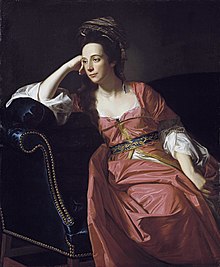Margaret Kemble Gage
| Margaret Kemble Gage | |
|---|---|

Portrait of Gage in the Turquerie style, circa 1771, by John Singleton Copley. This portrait is in the Timken Museum of Art in San Diego, California.
|
|
|
|
|
| Born | 1734 New Brunswick, New Jersey |
| Died | 1824 (aged 89–90) England |
| Residence | East Brunswick Township |
| Parents | Peter Kemble & Gertrude Bayard |
| Spouse | Thomas Gage |
| Children | Charlotte Margaret Gage, Henry Gage |
Margaret Kemble Gage (1734–1824) was the wife of General Thomas Gage, who led the British Army in Massachusetts early in the American Revolutionary War. She was born in New Brunswick, New Jersey and resided in East Brunswick Township. She died in England in 1824. Mrs. Gage was a gateway ancestor to centuries of English nobility who have Dutch and Huguenot ancestry from what was once New Netherlands and later the Thirteen Colonies of British North America.
Some historians feel that Margaret Kemble Gage may have been instrumental in causing the first shots to be fired in the American Revolution (the Battle of Lexington and Concord).
In the days leading up to the battle, the Sons of Liberty could see that the British troops in Boston were preparing for something. Dr. Joseph Warren, one of the key leaders of the Sons of Liberty, had a confidential informer, who was well-connected to the British high command. He could only use this informer for the most important matters, and this seemed like the time. The secret informant provided “intelligence of their whole design” – “to seize Samuel Adams and John Hancock, who were known to be at Lexington, and burn the colonists’ military stores at Concord.”
Gen. Gage had hoped to prevent a war. He had planned a secret night march, hoping to scoop up Adams and Hancock, as well as the colonial powder and cannon, while the colonists slept.
Instead, Warren, after learning of the plan, dispatched Paul Revere, who set off a chain reaction of alarm riders all across Massachusetts and even to adjoining colonies. Instead of a quiet night mission, the British troops found themselves opposed by thousands of wide-awake, angry, armed colonists.
...
Wikipedia
